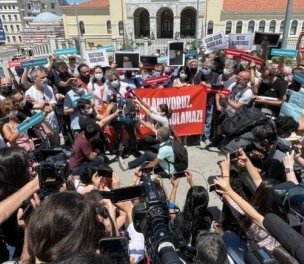Photo: Ctrl blog
Click to read the article in Turkish / Kurdish
The Nationalist Movement Party (MHP) has submitted a law proposal for regulating the activities of news outlets receiving funds from foreign organizations, Gerçek Gündem news portal reported.
If the bill passes, such outlets will have to assign a "Foreign Center Representative," who will register at the Ministry of Interior.
The person who will register as the representative will have to submit every kind of documents requested by the ministry. The law proposal says relevant outlets will keep should keep all written and digital records available for the ministry officials to review.
Also, the news outlets will have to explain all activities carried out with foreign funds. The Radio and Television Supreme Council (RTÜK) will issue a regulation about this issue.
According to article 5 of the bill, if the news outlets and persons in question fail to register as "foreign center representatives," they will face prison sentences of two to five years and monetary fines of 100,000 to 1 million lira (1 US dollar = 9.89 Turkish lira).
Those who fail to share the requested information with the Ministry of Interior will also face prison sentences of one to three years.
The bill is expected to be submitted to the General Assembly of the parliament after being discussed in the relevant parliamentary committee.
What happened?
President and Justice and Development Party (AKP) Chair Recep Tayyip Erdoğan said on July 21 that they would enact a new law to prevent fake news after the opening of the parliament in October.
On the same day, Odatv news portal reported that "Critical institutions in Turkey have turned out to be funded by hundreds of thousands of dollars from the US-based Chrest Foundation."
It listed the news outlets receiving funds from the foundation, an information which was already public on the websites of both the foundation and the news portals in question.
Odatv's report was followed by similar ones in pro-government media outlets.
A day later, Proceedings Communications Director Fahrettin Altun stated that they would make new regulations regarding foreign-funded news outlets to "to ensure that citizens have access to accurate news."
CLICK - New migration wave triggers 'foreign-funded media' debate
Developing projects and receiving funds* A project can be defined as the work to be undertaken by organizations such as associations/ foundations and the institutions working in the fields of gender, children, education, violence, media, etc. The budget of this work is called "fund." * In some countries, citizens apply for "public funds" for such works, they receive their support from the state and realize their projects. In some countries, it is not possible for every organization to access "public funds." You apply for global organizations, primarily to the European Union (EU), with your projects. * If the application covering the activities, the projected outputs and expenditures is accepted, an agreement is signed. The payment is made to the bank. For Instance, if you are a foundation, you fill out the Foreign Grant Notification Form and upload it to the Foundation Information Management System https://vbys2.vgm.gov.tr/login.aspx of the General Directorate of Foundations' Foundation Services Department, together with the bank receipt of the fund. As the information regarding your project is also included in the Form, it is now known from the very first step onward why the fund is sent. * At this stage, your application is added to the list of "pending approval." If the person responsible for your foundation at the Regional Directorate of Foundations approves the fund, you start using it. You cannot withdraw the money from the bank without getting the related approval. In that case, you are being fined for this behavior. * The activities and expenditures of the project are made in line with the agreement signed with the funding institution. * Generally, annual activity and expenditure reports are prepared. * It is inspected by an internationally recognized audit company whether the expenditures are made in line with the activities and the standards indicated in the agreement. * The reports sent by the audit company are discussed and approved by the funding institution as well. * An income and expense report on all types of expenditures are submitted to the Revenue Office once a year (by March 30). * Together with the profit and loss account statement, it is also sent to the Regional Directorate of Foundations every year by June 30. * Moreover, in addition to all these procedures, the state can place associations and foundations under inspections and audits any time. European Union (EU) fundsIn addition to the Instrument for Pre-accession Assistance (IPA), which is the main financial support instrument, Turkey has been benefiting from the EU Facility for Refugees in Turkey (FRIT), the European Instrument for Democracy and Human Rights (EIDHR) and the EU's Instrument contributing to Stability and Peace (IcSP) within the frame of its financial cooperation with the EU. https://www.avrupa.info.tr/en/instrument-pre-accession-assistance-ipa-880 As Turkey is an official candidate for EU accession, the EU supports political and economic reforms in the country with financial and technical help through the IPA. These funds aim at aligning Turkish legislation and standards with the EU's, building authorities' capacity for undertaking this harmonisation, and implementing the reforms throughout the accession process. The ultimate aim of pre-accession funds is to improve the lives of individuals, by providing them with better opportunities and ensuring they enjoy standards equal to EU citizens. The EU has allocated €4,453.9 million under IPA 2014-2020 for Turkey. The priority sectors to be supported are: democracy and governance; the rule of law and fundamental rights; environment and climate action; transport; energy; competitiveness and innovation; education, employment, and social policies; agriculture and rural development; and regional and territorial cooperation. The EU has been providing funds to Turkey in the below fields. As can be seen here, the funds are principally given to non-governmental organizations: Supporting Reforms in Justice, Home Affairs and Fundamental Rights |
(HA/VK)






aaa.jpg)
